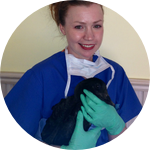About This Project
Exposure to mercury in their environment may be impacting the health of moose, leaving them more susceptible to disease and parasitism. The effects of mercury exposure may be an additional factor contributing to the sharp declines in moose numbers across North America. This project aims to quantify long term mercury exposure levels in moose from different regions across the country.Ask the Scientists
Join The DiscussionWhat is the context of this research?
Mercury is a toxic pollutant that is emitted into the environment as a result of many industrial processes. Although great strides have been made to reduce mercury released into the air and water from human activities, high levels of this toxin persist in many wildlife species distributed across many habitat types.
Mercury is a potent neurotoxin with many well-documented health effects. In wildlife, mercury has been shown to impact behavior, weaken the immune system, and decrease survival.
Wetland habitats can be mercury hotspots, and moose spend a lot of time in these environments feeding on aquatic vegetation - potentially leading to chronic mercury exposure.
What is the significance of this project?
Across North America, moose populations are in trouble. The most dramatic decline has been reported by Minnesota, where the moose population has dropped by 52% since 2010. Other states throughout the moose's southern range- including New Hampshire, Wyoming, and Montana- are also seeing alarming declines.
Urgent research is needed to identify the key factors impacting moose survival and health. The effects of chronic mercury exposure on moose may be an overlooked piece of this puzzle.
What are the goals of the project?
This project as a number of goals:
- Collaborate with moose researchers in New England, Minnesota, and the western U.S. to gather blood, fur, and tissue samples from moose. (NOTE: moose will NOT be harmed for purposes of sample collection. Tissue samples will be collected from deceased moose that died from other causes).
- Analyze samples in our lab to determine mercury levels and quantify short and long-term exposure.
- Compare and share data across regions.
- If elevated mercury levels are detected, conduct further research to investigate the potential health impacts of mercury in moose.
Budget
- This is a pilot study, and we urgently need funding to get the project off the ground this winter!
- All funds will go directly towards sample processing, shipping, and lab analysis costs.
- While $2000 is our initial goal, the more money we raise the more samples we can analyze to help us determine the link between mercury and moose health.
- All samples will be analyzed in our Wildlife Analytical Laboratory to determine mercury levels.
Meet the Team
Team Bio
Thank you so much for your interest in my research!I'm a veterinarian working for a non-profit wildlife research organization, BioDiversity Research Institute, based in Portland, Maine.
I have dedicated my career to wildlife health, working on projects across the globe from North America to Zambia to Australia. My current research focuses on the link between wildlife health, human health, and the environment- and the health impacts of environmental pollutants.
This vital research can help educate and inform policy decisions to protect environmental health. But in recent years, funding for this important work has been cut dramatically, causing major limitations and slowing our scientific progress. I am passionate about this work, and so I will continue to work tirelessly to find ways to continue my research, and I hope you can help!
For more information, you can visit my BRI staff page here
Thank you for reading!
Sincerely,
Michelle Kneeland
Lab Notes
Nothing posted yet.
Press and Media
For more information on our research on mercury in the environment and impacts on wildlife, please visit our website:http://www.briloon.org/hgcenter

Additional Information
** Want a unique gift idea for someone extraordinary in your life? Give a meaningful gift of science and conservation this holiday! You can give a sponsorship in someone's else's name, and we will send a personalized letter in their name. Contact mkneel02@gmail.com for details**We are so grateful for any size donation! Your generosity will allow us to continue our vital research to preserve environmental, wildlife, and human health. As a way for us to show our gratitude for your contribution, we are offering the following:
$10 donation: A personally written letter of thanks from the investigator and wildlife vet, Dr. Kneeland.
$30 donation: One moose sample analyzed! A personally written letter of thanks from the investigator, Dr. Kneeland, PLUS an official BioDiversity Research Institute car sticker that you can proudly display as a sign of your support of wildlife health.
$60 donation: Two moose samples analyzed! All of the above, PLUS a chance to talk one-on-one with the wildlife vet, Dr. Kneeland, either via phone, skype, facebook, or email (sponsor's choice).
$100 donation: Three moose samples analyzed! All of the above, PLUSa moose named in your honor! We will send you a personalized information packet about one of the moose in our study which will be named in your honor. Alternatively, you can have the moose named in someone else's honor as a gift. **Makes a unique and meaningful holiday gift for the wildlife lover in your life!**

One of BioDiversity Research Institute's many publications on mercury in the environment and impacts on wildlife health.

BioDiversity Research Institute analyzes thousands of wildlife samples for mercury contamination every year in our Wildlife Analytical Lab in Portland, Maine.
Project Backers
- 5Backers
- 5%Funded
- $86Total Donations
- $17.20Average Donation
